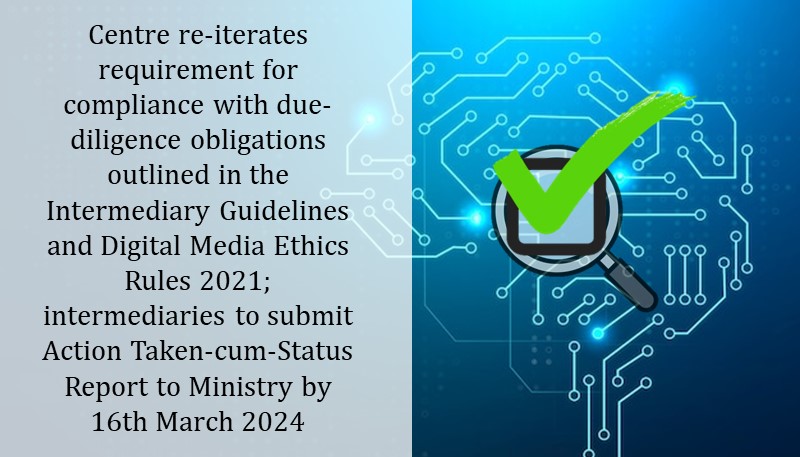Centre re-iterates requirement for compliance with due-diligence obligations outlined in the Intermediary Guidelines and Digital Media Ethics Rules 2021; intermediaries to submit Action Taken-cum-Status Report to Ministry by 16th March 2024

In furtherance to the Advisory released by the Ministry of Electronics and Information Technology (“MEITY”) addressing concerns regarding the spread of misinformation, especially through AI-generated deepfakes (please refer to the e-mail in trail for details), an extension to the advisory has been issued to intermediaries/ platforms, re-iterating the requirement for compliance with due-diligence obligations outlined in the Information Technology (Intermediary Guidelines and Digital Media Ethics Code) Rules, 2021 (“Rules”).
Intermediaries / platforms must comply with the Advisory and submit an Action Taken-cum-Status Report to MEITY within 16th March 2024.
Key Compliance Obligations:
All intermediaries or platforms are required to ensure the following:
1. The use of Artificial Intelligence model(s) / LLM / Generative AI, software(s), or algorithm(s) on or through its computer resource does not permit its users to host, display, upload, modify, publish, transmit, store, update or share any unlawful content as outlined in Rule 3(1)(b)* of the IT Rules or violate other provisions of the IT Act;
2. Guarantee that the computer resource does not permit any bias or discrimination or threaten the integrity of the electoral process including via the use of Artificial Intelligence model(s) / LLM / Generative AI, software(s) or algorithm(s);
3. The use of under-testing / unreliable Artificial Intelligence model(s) / LLM / Generative AI, software(s) or algorithm(s) and its availability to the users on Indian Internet must be done with explicit permission of the Government of India and be deployed only after appropriately labelling the possible and inherent fallibility or unreliability of the output generated. Further, ‘consent popup’ mechanism may be used to explicitly inform the users about the possible and inherent fallibility or unreliability of the output generated;
4. All users are required to be clearly informed including through terms of services and user agreements of the intermediary or platforms about the consequence of dealing with the unlawful information on its platform, including disabling of access to or removal of non-compliant information, suspension or termination of access or usage rights of the user to their user account, as the case may be, and punishment under applicable law;
5. Intermediaries facilitating the creation, generation, or modification of synthetic content, with potential misuse as misinformation or deepfake, are advised to label or embed such information with a permanent unique identifier. This label, metadata, or identifier should be designed in a manner that enables the identification of:
a. the intermediary’s computer resource used to create, generate, or modify the information,
b. the user of the software or other computer resource, and
c. the creator or first originator of such misinformation or deepfake
Non-compliance with the provisions of the IT Act and / or IT Rules may lead to potential penal consequences for the intermediaries or platforms or their users upon identification. Such consequences may include, but are not limited to, prosecution under the IT Act and various other statutes of the criminal code.
For further details, please refer to the Advisory attached herewith.
Source: Ministry of Electronics and Information Technology
———————————————————————————————
Rule 3(1)(b)* of the IT Rules: The intermediary shall inform its rules and regulations, privacy policy and user agreement to the user in English or any language specified in the Eighth Schedule to the Constitution in the language of his choice and shall make reasonable efforts by itself, and to cause the users of its computer resource to not host, display, upload, modify, publish, transmit, store, update or share any information that,—
(i) belongs to another person and to which the user does not have any right;
(ii) is obscene, pornographic, paedophilic, invasive of another’s privacy including bodily privacy, insulting or harassing on the basis of gender, racially or ethnically objectionable, relating or encouraging money laundering or gambling, or an online game that causes user harm, or promoting enmity between different groups on the grounds of religion or caste with the intent to incite violence;
(iii) is harmful to child;
(iv) infringes any patent, trademark, copyright or other proprietary rights;
(v) deceives or misleads the addressee about the origin of the message or knowingly and intentionally communicates any misinformation or information which is patently false and untrue or misleading in nature or, in respect of any business of the Central Government, is identified as fake or false or misleading by such fact check unit of the Central Government as the Ministry may, by notification published in the Official Gazette, specify;
(vi) impersonates another person;
(vii) threatens the unity, integrity, defence, security or sovereignty of India, friendly relations with foreign States, or public order, or causes incitement to the commission of any cognisable offence, or prevents investigation of any offence, or is insulting other nation;
(viii) contains software virus or any other computer code, file or program designed to interrupt, destroy or limit the functionality of any computer resource
(ix) is in the nature of an online game that is not verified as a permissible online game;
(x) is in the nature of advertisement or surrogate advertisement or promotion of an online game that is not a permissible online game, or of any online gaming intermediary offering such an online game;
(xi) violates any law for the time being in force;
Explanation.—In this clause, “user harm” and “harm” mean any effect which is detrimental to a user or child, as the case may be.